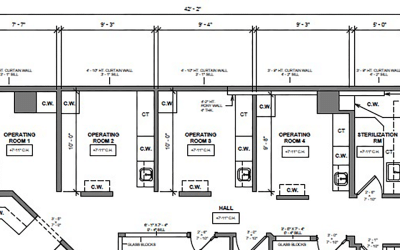You've been following the saga of Dr. Thrifty and the challenges presented by his dysfunctional team. Today we're going to take a moment to talk about something a little different - not the source of his problems, but the thing preventing him from really addressing them.
There's a syndrome that shuts down improvement or growth and it is traveling through dental practices at a high rate of speed. You may not even realize you have it, but soon you will recognize its symptoms. Unfortunately, this phenomena strikes someone in virtually every dental practice, regardless of who they are or what role they play; staff, team leaders and even owners, like Dr. Thrifty, can all suffer from it. The term alone can make a cute face morph into an ugly one that just sucked on a lemon. It's real... and its name is metathesiophobia.
Since I'm all about making things easier, we will simply call it the Fear of CHANGE and I think it's time we talk about it!


If I had a dollar for every time I heard someone say "it's just the way we've always done it", I would quit my job and volunteer as a clinical trainer. Einstein was on to something when he said that "the definition of insanity is doing the same thing over and over and expecting different results". Searching for opportunities and being open to change are absolutely essential if you want results better that the ones you're getting now.

There are a few ideas I want to emphasize before we go throwing the 'C' word around too much. First, understand that emotions relating to change are real. Second, there is a science to better understanding the phases and emotions that we go through when faced with change. It isn't my science, but it's science, nonetheless.
Denial: OMG! What? This isn't happening!
Reality: If we pretend it's not happening, it will go away.
Anger: It's not fair!
Reality: When change becomes real, denial turns to anger.
Bargaining: Postponing the inevitable.
Reality: Just give me a year or two... I'll do it as long as... let's make a deal.
Depression: Woe is me. I am not worth anything.
Reality: My efforts and my voice mean nothing here. I am not respected.
Acceptance: I'll be fine. Short term pain, long term results.
Reality: Coming to terms with the fact that this change is happening - has to happen. I may as well work with it.
'Change' must be implemented properly, partly because there is a lot that goes into making a 'change'. In our Reinvigorate Trainings, we sometimes reference a quote: "You can’t change people, but you can change people". Through my experiences in and with dental practices around the country, I have found that there are things you just can't teach. Customer service and work ethic are not taught, but rather developed gradually and nurtured daily. I have noticed 2 different types of dentists and how they handle 'change'. One type has really great ideas, but they don't do well when it comes to implementing them. A quick example would be if you were an owner who travels 2,000 miles across the country to a dental convention to purchase a machine that costs $100k. You are sold on the return on investment. Fast forward a week later - the answer to all of your problems shows up and sits in a box. You learned a lot this trip and cannot wait to tell everyone about your epiphany and how this new machine does everything - except open itself, unfortunately. The device arrives and is put gently behind the counter... and it sits... and it sits... and it sits... quietly in the corner of the office in a nice box that is taped to the nines. Everyone is afraid of it. It's as if it has the plague. If you don’t see it, it's not there, right!? Your dream machine and visions of prosperity are stepped over, on and around by your 'dream team'.

Then there are the other type of docs who don't have any ideas at all. These docs need help but want an overnight fix. This type will reach out to consultants who do nothing more than tell him/her what the problems are without offering a long term solution. The consultants give advice to the doctor who is supposed to implement on his/her own. In this situation, I have learned to appreciate that the same doctor who asked for help but doesn't know where his problems began. This doctor is like having indigestion. Eat... hurt... medicate... all better... repeat. Two weeks later, two months later, two years later... nothing is 'better'. This weekly/monthly/yearly pattern has now become a daily routine. People you eat lunch with start asking "gosh, are you ok? You’ve been Zantac-ing every day. Why?" You respond without thinking "I don’t know, I just have to". Think about what life would be like if you had taken a look at what you were eating weeks or months ago instead of focusing on how to breathe without feeling like you're having a heart attack after each meal. If you found out lemons were taking your esophagus on a rollercoaster ride through hell, would you continue eating lemons? What if there was an underlying issue? These are the "Quick Fix" doctors.
I've seen the devastating impact both ends of this spectrum can have on a practice; torn teams, stripped of confidence because the doctor has a new idea every other day, others rattled by constantly beating their heads against the wall hoping things will change with an overnight fix that never comes.
When I get the opportunity to work with a new practice, the first challenge I face is getting 'buy in' from the dental staff. Leadership can help, but even in great company, it is still a challenge. I learned early on there is one word I stopped using... change. Instead, I deliver phrases like 'opportunities for growth' and 'opportunities for improvement'. If you think about it, improvement and growth should be the results of change, right? I want the staff to tell me what is going great, which tends to be a short list. On the other hand, when I ask them to reveal areas in need of 'improvement', the list is much longer.
When you empower your team, you might be surprised. Your Human Capital is your biggest investment. This is LEAN thinking (we'll get to this one later). How do you set your team up for success? The first step is realizing that your success is dependent on theirs. Do you believe that? If we remove the barriers that prevent your team from accepting change, implementation is much simpler.
It starts with you, Dr. Leadership. Without leadership, it's all waste. Your team is craving leadership. Let's see if Dr. Thrifty can lead by example and embrace real change.





